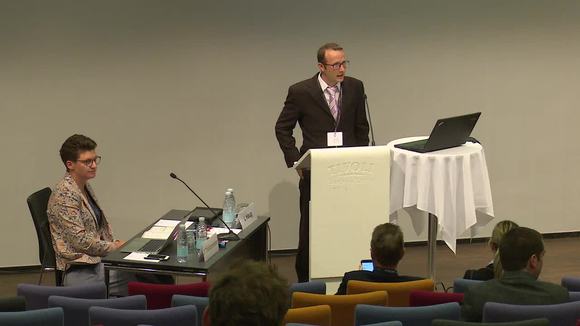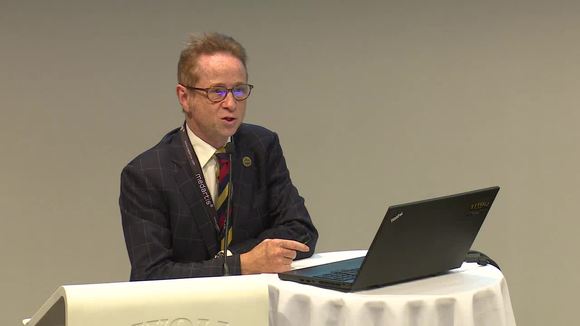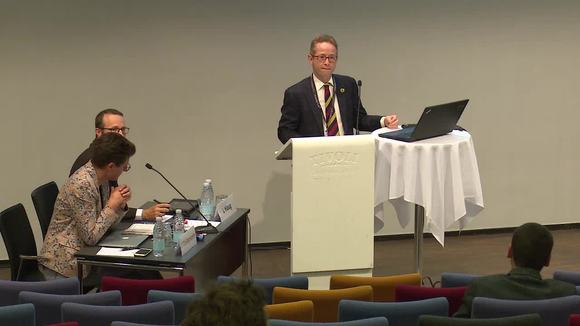Player is loading...
A-1234 Possibility of research within FESSH
Simon Farnebo, Linköping, Sweden
Friday, June 15, 2018 · 3:26 p.m. · 12m 44s
Embed
Embed code is not allowed
This talk is part of a Private webcast, embeding is not permited.Transcriptions
Note: this content has been automatically generated.
00:00:01
so my name is simon phone while function as a research chair at the council
00:00:06
i will tell you a little bit about um uh the state of the federation
00:00:12
and the research uh committee works towards uh promoting um
00:00:19
research within a the community um by various activities
00:00:24
will get back to some of them um
00:00:27
to be able to help uh you people
00:00:31
as being members of flash we need
00:00:34
to know how research active your and see what you want from flash
00:00:41
but it's kind of hard to know how to measure research activities within the federation
00:00:47
do we look at the tendons activities during fresh
00:00:51
meetings or do we look for submitted manuscripts
00:00:54
how active we are with publications patents funding
00:00:59
it's a very diverse society out there and uh it's
00:01:03
hard to know how active are members or
00:01:08
one way to look is going to the journal i i just i contacted them and ask them
00:01:15
for things like review were activity because i i would think that would be uh
00:01:21
one way to look at how and involved you are in
00:01:26
in research but as you can see it's a
00:01:29
very strong shift towards the british islands and you get one hundred forty reviewers
00:01:35
in u. k. whereas in for examples germany only have seven reviewers which is
00:01:41
kind of interesting and when you look at that and number papers submitted in various countries
00:01:48
it's a huge differences so maybe this is not um
00:01:53
a good way to look at activity so instead we decided to uh
00:01:57
asked a community so we launched a survey and i hope
00:02:02
some of you have asked to do this survey still open she can still access it and be part
00:02:08
of this because this is a way for us to understand how how we can help the committee
00:02:13
so far as of right before the meeting we had three hundred fifty responses
00:02:18
to this survey this corresponds to approximately eight percent of our members
00:02:25
and but you can see on the map these are the uh major respondents there are answers
00:02:31
from others countries also but um this is where we get most of our responses
00:02:40
who responded most uh the the responses came from male members i think this
00:02:47
gender difference probably reflects a what our society
00:02:52
looks like or federation that's fine
00:02:55
and as you can see the in the demographics we got most of response
00:02:59
are in between forty one and fifty um but this is the demographics
00:03:07
that we wanted to see if people who responded to this
00:03:10
survey if they worked in institution that hadn't academically active
00:03:15
life in one way to look at this was to see if there were academic positions in the institutions
00:03:22
we found that almost sixty percent had some kind of academic position but then there at a clinic
00:03:30
and the majority forty yeah most of them for and then forty percent of the cases it was
00:03:35
in the uh the system was in hand surgery and the rest was plastics and worth though
00:03:43
there were wanted to look at dedicated research time
00:03:48
and we found that only thirty percent receive dedicated research time and these
00:03:52
questions were directed towards residency period we wanted to focus on the
00:03:57
what was like during the early years of training and um
00:04:03
seventy percent of the respondents had no time at all to do research
00:04:08
and all the people that caught dedicated time only occasional days were given
00:04:15
and even more disappointing when you look at how
00:04:19
academic word was rewarded in their institution
00:04:23
more than fifty almost sixty percent said that we get nothing for doing this which is kind of set
00:04:30
i think for some of the people that higher salary even more dedicated
00:04:35
research time but more actively any could even help their careers
00:04:41
oh come to the positive part despite this more than eighty
00:04:45
percent of our respondents were actively research during residency so
00:04:52
and uh and almost forty five percent spent more than five
00:04:55
to ten hours per week do research which means that
00:05:00
most of the people more than eighty percent were still do research and they spent
00:05:04
approximately one extra day outside of their working week doing research despite not
00:05:11
having their institution promoting it or helping them in any way
00:05:19
most of the people that responded and we're doing clinical
00:05:24
studies i'm just a small percentage in preclinical research
00:05:31
when we ask people a during residency ari applied
00:05:36
do research work are there any requirements during your research it during your presidency and
00:05:43
more than sixty for sixty five percent were required to publish during residency
00:05:48
so there are a strong and there's a strong push which do research
00:05:55
but up side it's not very big
00:05:58
and more than forty percent were hard to to uh write it pieces which is really i think
00:06:04
unless you can see people have been during the residency here been pretty active
00:06:09
and many presentation during his national meetings and also international meetings
00:06:15
when we ask people if they would continue do research after residency
00:06:21
we find that more than eighty percent has to ambition
00:06:24
to continue doing research after residency which is fantastic
00:06:28
and the reason they wanna continue do research is because they enjoy
00:06:34
and for this question you could check many different options and
00:06:39
um the second most common reason for continuing doing research is to do
00:06:45
this come to meetings and meet other researchers and fellow hand surgeons
00:06:50
and also it helps to career yeah in some cases
00:06:56
so what limitations to people have for doing research what what are the the the main obstacles
00:07:02
and the number one thing is the lack of designated research time more than seventy percent
00:07:08
claim that if i got more time i would do more research lack of financial aid was the
00:07:15
second most common and maybe even with those two
00:07:19
are pretty obvious having seen that the results
00:07:22
but then lack of academic meant to ship is the third one and this is
00:07:27
kind of sad because documentation it's hard to start off a research career
00:07:33
and these three things are things that i think that
00:07:37
the research committee of fresh should work towards helping
00:07:41
and members of the federation so that we can be better and people can be better supported
00:07:48
to do research in the future so how can flash be a playroom promoting research
00:07:54
we could provide financial late through additional grants
00:08:00
it's not a very rich federation but we get in there and hopefully
00:08:04
we'll get more money for grants we could work on policy issues
00:08:10
maybe french can influence national societies to work for
00:08:13
better ability to get designated research time
00:08:18
there's a big debate in the us where they want to redirect
00:08:22
priorities during surgery training so that every resident gets designated research
00:08:28
time because they know that if you're active dubious precedence here is
00:08:33
you you're more prone to continue do research later on
00:08:38
i would also work on enhancing research training and maybe form a global mentor should program
00:08:46
help people to other ways to facilitate research forming
00:08:51
databases for research collaboration weapon arcs workshops
00:08:57
places where people can get better knowledge on how to set up the research
00:09:01
infrastructure say wanna start off your career research you want help with
00:09:08
getting started writing papers right grant applications hand in this way provide scientific condition
00:09:18
also they could be volunteer databases for at a research program that p. people could apply
00:09:24
for an it to get it a more global and seen a for research activities
00:09:35
this year we're launching have one of fascists first research grants there's
00:09:40
been a i heard before but last years there's been on
00:09:46
and we start talking what it what direction it should go into so
00:09:51
this here we're launching a grant it has the wide scope
00:09:55
it's primarily for you the people sitting in here it's
00:09:59
to encourage young investigators to initiate pilot projects
00:10:04
we see it as a seating rat you get this money to get
00:10:08
started and hopefully it will help you get out the grants eventually
00:10:13
is to encourage exploratory translation l. or developmental research
00:10:18
and we want it to be early conceptual stages of new clinical approach is not
00:10:24
doing and reach respected studies and he series
00:10:31
the prentice directed towards basic in translation science and u. i. d. es
00:10:36
we hope you can apply for it it's a ten thousand euro
00:10:39
word for one year grant application is on the website
00:10:45
you submit it together with all the supporting documents there
00:10:49
are few supporting documents deadline is september first
00:10:55
go for it
00:10:57
we also asked in this survey what grants do you want because we
00:11:01
are aiming towards building a core portfolio of grants in the future
00:11:08
um most common response was clinical or translation all signs
00:11:13
grants uh there's a push towards basic size grants
00:11:17
um we'll see what happens we need to get better funding but hopefully it'll be a increasing
00:11:24
um activity within the up within flash for
00:11:27
a financial aid for a research
00:11:32
and this actually this session was actually moved it was supposed to be on thursday sign
00:11:36
my last slide is a push for the networking event that was last night
00:11:42
but we're hoping that so this is gonna come back next year and so remember this um
00:11:50
it's it's an opportunity for people to come and present a research topic
00:11:58
if you got a great idea you may not want to stand here and give a
00:12:02
long cock you could just pitch an idea and that work is so yesterday bad
00:12:07
approximately fifty people networking talking about research projects over beer
00:12:12
just very informal and this is gonna come back and we hope that this gonna
00:12:16
be regular vent for research and innovation and within flash okay thank you
00:12:25
hi thank you so much
00:12:33
any questions for moment
Conference Program
A-1233 What do we expect from FESSH
Luzian Haug, Bern, Switzerland
June 15, 2018 · 1:59 p.m.
A-1233 What do we expect from FESSH - Q&A
Luzian Haug, Bern, Switzerland
June 15, 2018 · 2:04 p.m.
A-1240 How to get your paper published
Grey Giddins , UK
June 15, 2018 · 2:05 p.m.
124 views
A-1240 How to get your paper published - Q&A
Grey Giddins , UK
June 15, 2018 · 2:22 p.m.
A-0792 Interobserver Reliability Study of the Classification of Scaphoid Waist Fractures using Computer-Tomography
Rasmus Wejnold Jørgensen, Anders Klahn, Johannes Heindl, Lars Solgård, Lars Vadstrup, Dejan Susic, Robert Gvozdenovic, Stig Jørring, Claus Hjorth Jensen, Hand Clinic, Department of Orthopedics, Herlev-Gentofte University Hospital of Copenhagen, Denmark
June 15, 2018 · 2:23 p.m.
A-0237 Neuropathic pain after repair of brachial plexus injury : a 30-year follow-up of the Narakas' series
Swenn Maxence Krähenbühl, Chantal Bonnard, Laurent Wehrli, Lausanne University Hospital, Lausanne, Switzerland
June 15, 2018 · 2:29 p.m.
A-0482 Pisiform Excision; a solution for a long-term ulnar sided wrist pain. A retrospective analysis, comparing pre- and postoperative measurements
M.V. van Burink, S. Al Shaer, J. van Rossen, A. Fink, H. Slijper, T. M. Moojen, H. Rakhorst, G. van Couwelaar, R. Feitz, O.T. Zöphel, Xpert Clinic, The Netherlands
June 15, 2018 · 2:35 p.m.
2024 views
A-1075 Extensor tendons adhesions: the role of different anti-adherent agents. Preliminary evidences from an Italian multicentric study.
Alfio L Costa, University of Messina, Department of Human Pathology of the Adult, the Child and the Adolescent, Messina, Italy
June 15, 2018 · 2:42 p.m.
A-0328 Prevalence of the Linburg–Comstock Anomaly in Women with Carpal Tunnel Syndrome
Saulo Rodrigues Moreira, Carlos Henrique Fernandes, Lia Myamoto Meirelles, Luis Renato Nakachima, João Baptista Gomes dos Santos, Flavio Fallopa, Hospital São Paulo/Universidade Federal de São Paulo/ Department of Orthopedic Surgery/ Hand Surgery Unit, Brazil
June 15, 2018 · 2:51 p.m.
112 views















